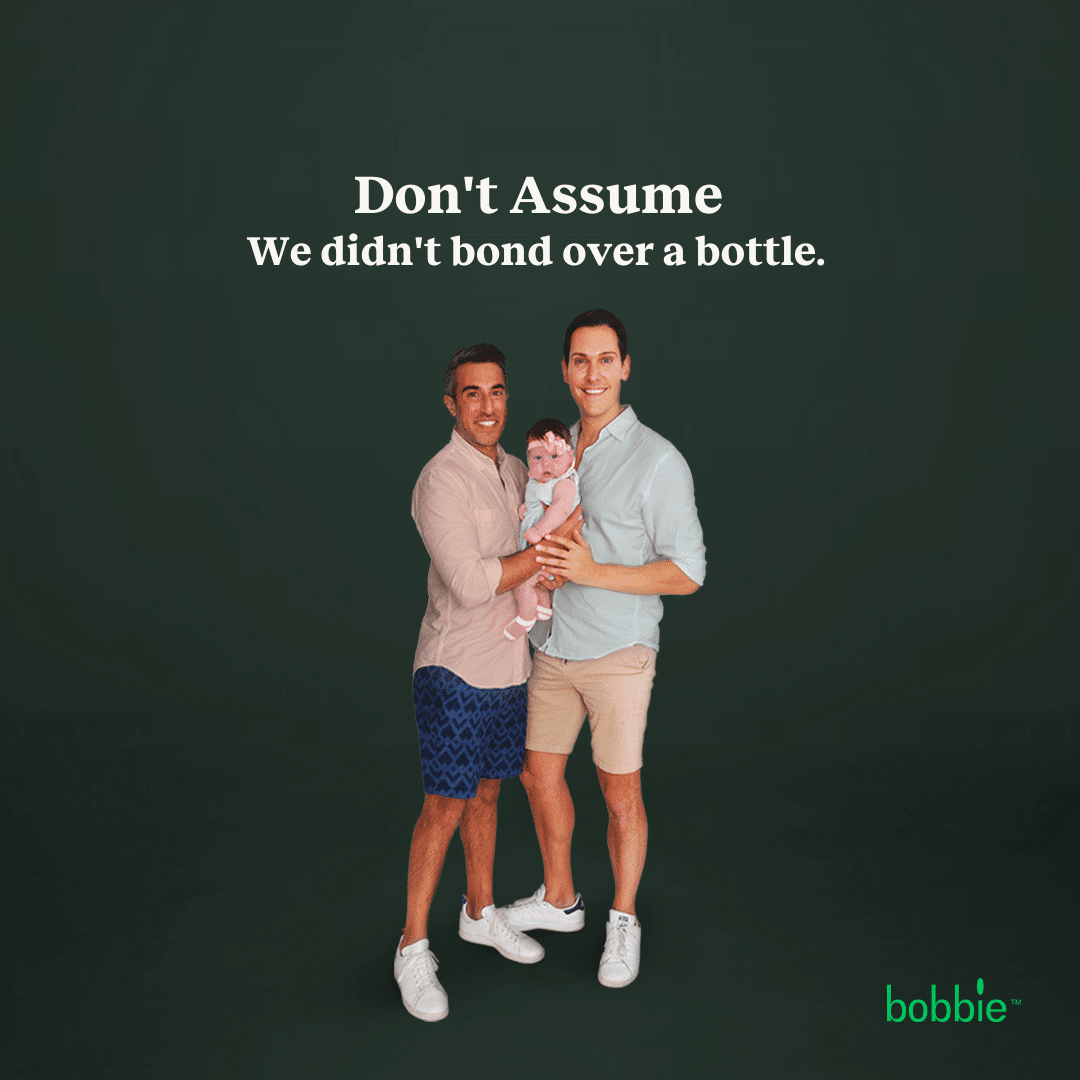We are proud to say that these posts are not sponsored. Our editorial team of Bobbie moms and writers personally select each featured product. If you buy something through our links, we may earn an affiliate commission, at no cost to you.
Growing up, David Rak and Oren Henry always wanted to be dads. It was a desire the couple bonded over early in their relationship. Their wish became reality four-and-a-half months ago when they welcomed their daughter Maya Isabella into the world.
Bonding over a formula bottle
“I love just holding the bottle and holding her close,” says David, 40. “I love having her look up at me and catch my gaze. We will stare at each other while she’s drinking and every so often, I see a smile. It’s such a connective moment, like she is memorizing my face. At times, she will smile, lose the bottle nipple and milk will dribble down her face. It’s a funny, beautiful moment.”
Dads and oxytocin
Oren added, “Before Maya was born, David and I were watching ‘Babies,’ a Netflix series documenting fatherly attachment to babies. The show looks at the boost of oxytocin in fathers over the first few months of their babies. Oxytocin is the chemical that builds bonding and for decades people believed it only came from a mother is why the mother and baby bond is thought to be so unique. But this show studies fathers. It turns out men develop this chemical reaction through cuddling, feeding and closeness. Dads can have that same chemical bond with their babies without carrying the child, without birthing the child and without breastfeeding the child. I totally feel it and I know David does too.”
Same sex surrogacy
With Maya being born via surrogate, David and Oren knew at some point, baby formula was going to be a part of their feeding journey. However, Maya started off as both a breast and formula fed baby, thanks to the couple’s surrogate.
“When Maya was born, our surrogate, who is just amazing, breastfed Maya so she could get the colostrum,” David says. “But since our surrogate was only in the hospital for a day we needed to supplement with formula the rest of the time we were there. In the hospital we had to sign paperwork acknowledging that breast is best and that we were allowing formula use. It didn’t make us feel bad because we knew we didn’t have many other options but seeing all the TV ads talking about how breast is best was a little off putting. Everyone was perfectly nice to us but there was this push that breastmilk is what you are supposed to use.”
Supplementing with baby formula
When David, Oren and Maya left the hospital, the couple’s surrogate continued to pump and send them breast milk for a little over a month.
“She shipped us a ton of milk those first seven weeks, but then her supply dried up,” explains David. “We knew at some point that would end which was ok. We were happy to get whatever we could in those early days. And now knowing we are providing nutrients to Maya and promoting growth and bonding through formula makes us feel like great parents.”

Exclusively formula feeding
David and Oren did look into getting breast milk elsewhere but were advised against it.
“A friend of mine from college who had a baby a few months before Maya was born offered to send us her leftover milk,” Oren says. “We were ready to go in that direction, but our pediatrician told us if the milk wasn’t coming from our surrogate we should shift from breast milk to formula.”
Now, Maya is exclusively formula fed and at four-and-a-half months is sleeping through the night.
“We have girlfriends who are jealous of Maya’s solid eating and sleeping schedule, which we credit in part to the fact we know how much she’s eating at one time,” Oren says with a little chuckle. “Seriously though, no matter how parents decide to feed their child, we are all trying to do what’s best for them. Just like with everything in parenting, there is no right or wrong answer when it comes to feeding. We have a wonderful, smiley talkative four-and-a-half month old who is changing and growing every single day in spite of the fact she only got limited breastmilk.”

